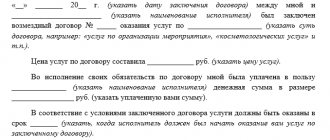Refunds for services not provided: law on consumer protection
Basic Law regulating the rights and protection of the interests of the customer No. 2300-1 dated 02/07/1992 (as amended on 06/04/2018).
Article of the Law regulates the consumer’s right to refuse an agreement for the provision of services, provided that the customer will reimburse the contractor for the costs incurred by the latter in connection with the fulfillment of the obligations assigned to him by the agreement.
At the same time, the law gives the consumer of services the right to refuse reimbursement of expenses incurred by the contractor if, within the framework of the concluded contract for the provision of paid services, the contractor violated one or more essential terms of the transaction or the legal requirements for the provision of services. At the same time, the consumer who did not receive the service on time has the right to refuse to perform it and receive a refund for services not provided (Article 28, paragraph 1, 3 of Law No. 2300-1). If the contractor refuses to provide services (if the consumer has not accepted the service), he cannot demand payment and reimbursement of his costs under the contract (Clause 4, Article 28 of Law No. 2300-1).
How to cancel the service and get a full refund?
We will talk about how to simply terminate a contract for the performance of work or the provision of services below.
And now we will discuss how to refuse to fulfill a contract for the provision of work or services and return all the money and in what situations this is possible, as well as how to do everything correctly.
Let's start with this: you discovered a flaw in a service or work and want your money back. In such a situation, no one will simply return them to you, because according to Part 7, Clause 1, Article 29 of the Law on the Protection of Consumer Rights, the discovery of a defect is not a reason to refuse to fulfill the contract for the provision of services; of course, you can refuse at this stage , Article 32 of the “Consumer Rights Protection Law” allows you to do this, but it will not be correct. In such a situation, on the basis of the law, you must specify in the contract the period within which the contractor must eliminate the shortcomings you have discovered, and if the contractor does not eliminate these shortcomings within the time period established by the contract, then this is precisely the legal basis for refusing to fulfill the contract for the provision of services and you You have the right to demand a refund of your money for poor-quality service.
For example, in your bathroom you should put tiles on the walls and floor, which was done, but then you discovered that in the corner one or two tiles were not laid level (not level, they stick out above the rest, etc.) , which is considered a defect and according to the contract you gave the contractor 2 days to eliminate it, these terms were additionally specified in the contract, but the contractor did not eliminate the defects within the prescribed period, in such a situation you have the right to refuse to fulfill the contract for the provision of services and return the amount of money you paid .
Second situation. If the consumer has discovered significant deficiencies in the work performed or service provided, or significant violations (derogations) of the terms of the contract on the part of the contractor, then in such a situation the consumer has the right to refuse to fulfill the contract for the performance of work or provision of services without setting a deadline for eliminating the deficiencies.
A significant drawback is a drawback the elimination of which will require costs significantly exceeding or close to the cost of the work or service. Either it is a defect that cannot be eliminated without a disproportionate amount of time, that is, if the elimination of the defect takes time that exceeds the period established by agreement of the parties for eliminating the defect, or a period limited to 45 days, and if the period is not defined, then the time exceeds the minimum period required for eliminating this deficiency using a commonly used method. Or if the deficiency appears again after it has been eliminated. Services or work with deficiencies that fall under these criteria are considered to have significant deficiencies.
It turns out that if a tile was laid for us and the next day it fell off, completely or a significant part of the area, then this is considered a significant drawback. It will also be considered a significant flaw if the tiles fall off gradually, for example, the first time 2 tiles fell off, the contractor eliminated the flaw, after which 2 more tiles fell off, they fixed it again and after a certain time several more tiles fell off, as we see, the flaw appears after it is eliminated again and again and this is considered a significant disadvantage. Also, if the contractor allows significant deviations from the terms of the contract, for example, we use materials that were not specified in the contract, or if the contractor significantly violates other terms of the contract, then the consumer has the right to refuse to fulfill the contract and demand a refund of the amount paid for services and compensation for losses that incurred by the consumer due to defects in the service. For example, if a lack of work led to damage to the materials provided by the consumer. Such requirements are satisfied within 10 days from the moment the consumer presents them to the contractor.
How to correctly present a demand to the contractor, read below.
But first, let's look at another way to refuse to fulfill a contract for the performance of work or provision of services.
Refund to the service consumer
The procedure for returning funds for services not provided is regulated by the provisions of Article 28 and the above law, and consists of three main stages:
- establishing the fact of non-provision of services;
- drawing up a claim for the return of paid funds and presenting it to the contractor;
- waiting for the executor's decision and return of the money paid.
If the dispute is resolved peacefully, at the stage of returning funds to the customer of the service, the conflict is considered resolved. If the contractor refuses to satisfy the claim, the service consumer has the right to turn to a third-party organization (this may be a regional or territorial department for the protection of consumer rights, a branch of Rospotrebnadzor, etc.), or to file a claim for consideration in court.
Customer Reviews
Gratitude from Rusanova N.V. I sincerely thank Konstantin Vladimirovich Ivanov and Sergei Vyacheslavovich Mavrichev for the qualified information assistance provided in a friendly atmosphere of communication, as well as for providing the opportunity to obtain guaranteed legal support in the future.
Rusanova Natalya Viktorovna, Associate Professor of the Department of Russian Language and Literature of St. Petersburg Mining University.
Review by Minina M.V. I would like to express my deep gratitude to Yuri Vladimirovich Sukhovarov for his competent advice and qualified assistance on my issue.
With gratitude, Minina Margarita Vladimirovna.
Review by Lobova E.I. Dear Lyubov Vladimirovna, I, Evgenia Ilyinichna Lobova, would like to express my deep gratitude to lawyer Yuri Vladimirovich Sukhovarov for the objective, complete, competent consultation on an issue that interests me. As theater begins with a hanger, I cannot help but note the exceptional politeness of the administrator Daria Vladimirovna Kutuzova.
I wish you great success! Lobova E.I.
Review by Sokolov M.Yu. I express my gratitude to your company, as well as Denis Yurievich Stepanov and Daria Valentinovna Kutuzova for their conscientious attitude to their duties.
With sincere respect, Sokolov M.Yu.
Review by B.I. Goreky Gratitude to Yuri Vladimirovich from B.I. Goreky for the consultation on family rights.
Gratitude from Truk N.N. I would like to express my gratitude to Vasily Anatolyevich Kavalyauskus, Alexander Viktorovich Pavlyuchenko and Maxim Andreevich Lobur for providing qualified legal assistance, with the help of which my problem was resolved quickly and clearly. When contacted, I always found understanding and attention. It’s good that the “Society for the Protection of Consumer Rights” employs such lawyers and advocates. I wish you success in your future work and defending the interests of consumers.
Sincerely, Truk N.N.
07.05.2018
Letter of gratitude to Ermakov A.V.
Review by G.N. Antropova To the lawyer of the Legal Agency of St. Petersburg A.V. Ermakov
I express my gratitude to you for your professionalism in protecting my interests in a criminal case, Andrey Valerievich, allow me to express my gratitude to you for your help and support. I note your high professionalism and skillful actions in defending my positions.
Best regards, G.N. Antropov
Gratitude from Gordeeva E.S. I express my special gratitude to Sergei Vyacheslavovich for his highly competent and detailed consultation on the issue of the employment contract.
Doctor of Philological Sciences, Gordeeva E.S. 12/01/2018
Gratitude from Balitskaya A.S. I express my deep gratitude to Alexander Viktorovich Pavlyuchenko for his efficiency and professionalism in resolving controversial issues. The pre-trial settlement was completed as quickly as possible.
Balitskaya A.S., 05/15/2019
Sequencing
Making a claim
When writing a complaint to the contractor, you should adhere to the rules for preparing official documents. A correctly drawn up claim sample for a refund for services not provided must contain:
- information about the customer of the service - last name, first name, patronymic (in full spelling), passport details, address, telephone number;
- information about the contract for the provision of services – number and date of the contract, type of service ordered, deadlines for execution, cost of the service;
- information about the contractor’s violation of the terms of the contract for paid services (indicating the volume of unprovided services, refusal to fulfill obligations);
- information about funds paid under the agreement - the amount and form of payment;
- an indication of a violation of consumer rights, which represents a violation of the terms of the contract for the provision of paid services;
- statement of demands for reimbursement of funds.
When writing a claim, it should be taken into account that financial disputes are considered only with the provision of supporting documents, therefore you should attach photocopies of documents confirming the conclusion of the transaction, the fact of prepayment for services that were not provided (agreement for paid services, checks, receipts, payment orders, warranty cards and so on.).
Filing a claim
The claim can be submitted to the contractor in several ways:
- when applying in person - in this case, you should have a second copy of the claim with you, on which the recipient must make a note of receipt, putting the date and time of delivery of the document, and his signature;
- by sending by postal service - in such cases, you should send it by a valuable letter with a notification and a description of the attachment. With this form of filing a claim, proof of its receipt by the contractor will be the post office’s mark on delivery of the item to the addressee in the notification form.
From the moment the claim is served, the contractor is given a strictly limited time to make a decision. The deadlines for the return of funds for services not provided are established by the norms of Art. 31 of the Law of the Russian Federation “On the Protection of Consumer Rights”. The law allows 10 calendar days to make a decision and voluntarily return funds to the consumer. The calculation of the period begins from the moment the contractor receives the claim.
What if I cancel the service right away?
According to Article 32 of the Law on the Protection of Consumer Rights, the consumer has the right to refuse to fulfill the contract for the performance of work (rendering services) at any time if the consumer pays the contractor the expenses actually incurred by him, which are associated with the fulfillment of obligations under the contract.
That is, it turns out that regardless of whether there are shortcomings in the work or not, the consumer has the right to refuse the service at any time, but at the same time he is obliged to reimburse the contractor for all actual expenses incurred by the contractor in connection with the performance of work or services under the contract. But the costs incurred must be proven by the contractor; for this, estimates, certificates of completion and other evidence of costs incurred must be provided.
Article 32 of the law is not appropriate to apply if the consumer discovers significant deficiencies or significant deviations from the contract for the provision of services or performance of work; in such a situation, as mentioned above, part 7 of paragraph 1 of Article 29 of the “Law on the Protection of Consumer Rights” applies.
That is, if you refuse a service, regardless of whether it was defective or not, then the consumer will be returned the money he paid for the service, minus the costs actually incurred by the contractor.
That is, we get the following picture. You bought a subscription to the pool, took 2 classes and then decided not to continue attending sessions, then according to Article 32 of the “Law on the Protection of Consumer Rights”, you have the right to refuse to fulfill the contract (the contract in this case is the subscription you purchased) and demand a refund of the amount paid for the service of a sum of money, accordingly, on the basis of Article 32, the contractor returns you the money for the subscription, but deducts from it the actual costs incurred, that is, money for 2 visits to the pool.
This approach with a refund under Article 32 is justified if the service is of adequate quality, but for example, it is not suitable for the consumer or does not like it for personal reasons. But if there are shortcomings in the service, then it is better to set a deadline for the contractor to eliminate them, and if he does not fulfill it or performs it improperly, then even then it is necessary to refuse to fulfill the contract and return the amount paid in full, as well as reimbursement of other expenses in connection with improper performance of work or provision of services.
How to get money back for poor quality service?
In such situations, the matter is usually not resolved without a fight and most likely the money will not be returned to you voluntarily. Of course, you can call or come to the service provider’s office and talk peacefully, but in the vast majority of cases this does not lead to anything, especially when it comes to getting your money back.
If you are refused, then you need to file a claim with the service provider, the organization with which you had a written agreement to provide you with certain services.
But you also need to understand in what case this claim needs to be filed, otherwise you will waste your time and do useless work.
Let me first tell you in which situation you should file a claim right away, and in which situation only after a certain point.
And so you discovered a deficiency in work or service that is not significant, by law you must give the contractor time to correct the deficiency and this period must be indicated in the contract, if the contractor does not eliminate the deficiency within the specified period, then you have the right to refuse to perform the contract and demand a refund of the amount paid for the service, as well as compensation for losses due to improper fulfillment of obligations. If the service provider refuses to comply with your requirements, then you send him a written complaint stating your requirements. This is the first case, that is, you cannot immediately file a claim here; a claim is filed if the contractor did not eliminate the deficiency in the time allotted by you and refused to return the amount paid under the contract to you.
The second situation is if you discover a significant deficiency in the service or significant deviations from the terms of the contract on the part of the contractor. In such a situation, you immediately have the right to terminate the contract and demand the return of the amount of money paid under the contract. If the contractor voluntarily refused to fulfill your requirements, then we send him a claim in writing.
I hope I clearly explained the difference between these two situations, because according to the law, if you find shortcomings in the service that can be corrected, you must demand their elimination within the period specified in the contract, and if the shortcomings are not eliminated within this period, you can terminate the contract and demand a full refund. And if the deficiency is significant or the contractor allows a significant deviation from the terms of the contract, then you can immediately terminate the contract. But if the contractor refuses to fulfill your legal demands voluntarily, then you can send him a claim and if after that your demands are not met within 10 days, then you need to go to court.
If the service provider refuses to voluntarily fulfill your requirements
We have already discussed with you that if the contractor of work or services refuses to voluntarily fulfill your legal requirements, then it is necessary to send a claim to him.
It is written in two copies, it must indicate to whom the claim is being sent and from whom, also indicate the way in which you can be contacted. Then we write the text of the complaint itself. The tone is businesslike, no stories from life, we write everything to the point, with references to the law and legal acts. Write for what reason you are filing a claim, what rights are violated, under what agreement and on what date. What actions did you take to resolve the dispute? Then write what norms of the law were violated by the performer. And at the very end, you write your requirements and give the contractor time to fulfill the requirements and respond to you, usually by law this is 10 days. Put your signature, date, and if it is necessary to attach documents to resolve the issue, then attach photocopies and describe in the claim what documents are attached to it.
The claim is drawn up in two copies, you give one to the addressee, and on the second the person who accepted the claim puts his signature and the date of acceptance; it would also not be amiss to ask for a stamp or assign an incoming number.
You can personally carry it and hand it over to the addressee, or send it by registered mail with an inventory and return receipt.
You see what’s the matter, sometimes when you come to an organization, they may refuse you and not accept your claim personally, citing fictitious reasons. Don’t be upset, let alone quarrel with the performer, don’t spoil your mood. We go to the post office and send the same claim by registered mail with a list of the contents and a receipt. The fact that the addressee has received the claim will be a notification that you can receive by mail. It doesn’t matter whether the addressee reads your claim or not, the fact of delivery will be sufficient.
The same thing, if your copy of the claim bears the signature of the person who accepted it, the date and seal, it means that the claim has been accepted and you count 10 days from the date of submission of the claim, and if during this time your demands are not met, then file a lawsuit . The same is with sending by mail, if within 10 days from the moment of delivery of your letter to the addressee nothing happened, you were not contacted, called or offered to resolve the issue, then we will go to court, the date of delivery will be on the notification.
The court, of course, if there are no violations on your part, will decide in your favor, the court in most cases stands in the consumer’s place.
In order to file a lawsuit, you need to file a statement of claim. You can draw it up yourself, or you can contact a lawyer in your city. If the amount of the claim does not exceed 50,000 rubles, then the statement of claim is submitted to the magistrate, and if the amount of the claim is more than 50,000 rubles, then we submit the application to the district court. The state fee for disputes regarding the protection of consumer rights is not paid by law.
Also, the court, in accordance with Part 6 of Article 13 of the “Law on the Protection of Consumer Rights,” collects from the executor in favor of the consumer a fine in the amount of 50% of the amount of the claim for refusal to voluntarily satisfy the consumer’s demands. That is, if the amount of the claim was 30,000 rubles, then in addition to these thirty thousand, another 15,000 rubles will be collected in your favor, which cannot but rejoice. You can also later collect a penalty from the contractor for unlawfully using your funds.
It didn't work out peacefully. What to do?
If the conflict between the customer and the contractor has not been resolved through a claim procedure, the service consumer has the right to go to court to resolve the dispute and make a decision on reimbursement of funds for services not provided.
In this case, the statement of claim in the informative part does not differ from the claim written earlier to the contractor, only the “header” of the document – the addressee – changes, and additional information about the refusal of the contractor to voluntarily satisfy the legal demands of the consumer is added to the statement.
The statement of claim should be accompanied by copies of all evidentiary documents, including the claim previously filed against the executor. The original documents are presented to the court directly during the court hearing.
When filing a claim for the return of funds for services not provided, the plaintiff, in accordance with paragraph 3 of Article 17 of the Law of the Russian Federation “On the Protection of Consumer Rights,” is exempt from paying state duty. At the end of the hearing, if the court decides in favor of the plaintiff, the court will place this burden on the service provider.
Court decisions
The case of balcony cladding: how to find justice for an unscrupulous contractor
Furniture store paid for late payment
The car dealership does not give away the car
How to get your money back for a robot vacuum cleaner that didn’t live up to expectations
The mobile operator paid for the error
Online scammers: the case of a missing online store
Return of money in accounting
Refunds can be made in two ways:
- in cash – if payment under the contract for paid services was made by the customer in cash;
- non-cash payment – if payment was made from a card or bank transfer, or if the customer specified this requirement separately.
The posting of accounting transactions when returning money deposited in cash at the cash desk and funds transferred from a card or by payment order will vary.
Let's look at an example of how a refund should be processed for services not provided, transactions through the cash register and the bank:
- non-cash payments:
D62.01 K51 – return to the customer of funds received as payment for services. The amount transferred from the account is indicated.
D62.02 K51 – return of advances paid to the customer of services. The amount of the advance payment to be returned is indicated;
- cash payments:
D62 K50.01 – return of cash to the consumer for services not provided.
How to sue for a service not provided?
If it is impossible to peacefully agree with the contractor regarding the return of money for an unprovided service, the client goes to court. In this case, it is necessary to follow the claim procedure for any disagreements that have arisen and file a claim.
The application is prepared in any form, but according to Article 131 of the Code of Civil Procedure of the Russian Federation, the content should be as follows:
- initials, registered address and contact details of the plaintiff;
- the type of service that was to be provided and the time the contract was signed;
- when and under what circumstances the payment was made;
- clarification of the fact of non-provision of services;
- reporting information regarding a preliminary appeal to the contractor with a request to return the prepayment;
- for what reason the money was not returned to the customer;
- links to regulations;
- a request to recover from the defendant an advance payment and a penalty for late payment, as well as an award of compensation for moral damage (Article 15 of the Law of the Russian Federation);
- list of applications;
- date and signature.
The statement of claim for the return of money for a service not provided must be drawn up in three pieces. One copy is marked in the court office and given to the applicant, the second is used in the proceedings and the third is sent to the defendant.
An approximate example of an application to the magistrates' court for the return of money for a service not provided can be
Necessary documents for the trial:
- agreement between the customer and the performing party;
- payment orders, checks and receipts (confirming payment basis for the service);
- claim letter;
- the contractor's response to the complaint.
If there is no agreement, then witnesses must be invited to the court to confirm the fact of the transfer of money by the consumer.
Service Provider Responsibility
The limits of the contractor's liability for failure to provide services or poor quality provision of services under the contract are established by the norms of Art. 393 of the Civil Code of the Russian Federation, according to which the dishonest actions of the contractor can result in serious financial losses for him - in addition to the direct return of the full amount of funds paid by the customer, the service provider may be required to pay losses, penalties, interest, etc.
Moreover, it should be noted that the concept of dishonest actions of the contractor is considered quite broadly by the provisions of this article, and covers not only compensation for actual damage or lost profits incurred by the customer. In cases where the contractor, having ignored the terms of the contract, forced the customer to enter into a new relationship with another service provider, the court may oblige the contractor to compensate for the difference in material costs.
What is this according to regulations, articles of the Civil Code of the Russian Federation and the Law on the Protection of Consumer Rights?
The concept of “unprovided service” is not clearly defined in the law on the protection of consumer rights, but it can be derived by following the content of the law and other related regulations (in particular the Civil Code of the Russian Federation). If the service is not provided or was not accepted for some reason, then both the customer and the contractor have certain rights and obligations, but their content depends on the reasons why the service was considered not provided.
Any relationship between performers (no matter whether it is an individual or an organization) and consumers is regulated by Chapter 3 of Federal Law No. 2300-1 “On the Protection of Consumer Rights.”
An unprovided service can be expressed:
- Failure to fulfill obligations under the contract by the contractor.
- The service was not provided on time.
- The service provided is of poor quality. What does it mean to provide services of inadequate quality and what are the rights of the customer and the responsibilities of the contractor, read here.
- The consumer did not accept the service.
- The contractor refused to provide the service (either completely or partially).
- The customer, due to unforeseen circumstances, will not be able to use the service (force majeure).
Possibility of collecting money according to the law if the work was not completed
Federal Law No. 2300-1 contains information on the amounts and procedures for returning funds for a service that the customer did not accept or did not receive; the fundamental link here is the one through whose fault the terms of the contract were violated.
Payment for the service, according to the terms of the contract, can be made either in full or in parts, in the form of:
- deposit;
- prepayments;
- or advance.
Few people understand the difference between these concepts, but it exists and is very important when the issue concerns a refund.
A deposit is a form of payment regulated by Articles 380 and 381 of the Civil Code of the Russian Federation. The deposit performs two important functions when concluding a contract:
- Proof of his conclusion.
- Ensuring the fulfillment of obligations by each party to the contract.
Therefore, in accordance with the law, the return of the deposit has a special complex procedure, and if for some reason the customer himself refused to accept the services, then he will not receive his deposit back, and if the service is not received through the fault of the contractor, the deposit is returned in double size. It is better to reflect the payment of the deposit in the contract or additional agreement.
An advance is a simpler form of paying money for a service; it is considered an advance payment that is necessary for the preliminary expenses of the performer; its payment must be indicated in writing, at least by drawing up a receipt. The advance is not regulated by the Civil Code of the Russian Federation, and therefore, if the service is not provided, the consumer has every right and basis to demand a refund of the advance.
Through the fault of the performer
- The contractor refuses to perform the service without good reason. Therefore, in this case, in addition to the money paid, the consumer has the right to demand payment of a penalty.
- If the organization providing the service does not fulfill its obligations due to insurmountable circumstances (specified in the contract), then the money is not returned to the customer (clause 4, article 13 of the Law on the Protection of Consumer Rights).
Due to the fault of the customer
- If the consumer changes his mind about using the company’s services before they begin, then in this case all the money that was paid should be returned to him.
- The consumer decided to terminate the contract after the organization began to fulfill its obligations - the money is returned to him, but the expenses incurred by the contractor for the work will be deducted from the amount paid.
Courses for household purposes
Let's consider how money should be returned if the course was purchased for personal, household purposes. For example, lessons for housewives on cooking borscht.
Current legislation guarantees the consumer the right to refuse to fulfill the terms of the contract at any time if he reimburses the actual expenses of the contractor associated with the fulfillment of obligations under the contract. In this case, the burden of proving their size rests with the performer.
From this we can draw conclusions:
1
The consumer's right to refuse to take a course cannot be limited. Even if you include such a condition in the contract, it will be considered invalid.
2
You can only reimburse expenses associated with training a specific student on a course. At the time the student withdraws from the course, they must be charged.
Actual expenses cannot include the work of a stylist, videographer, editor, copywriter, advertising costs and similar. You bear them in general for the creation of a course, and not for a specific consumer; the courts do not recognize as actual impersonal expenses for training one student (see the ruling of the Supreme Court of the Republic of Bashkortostan dated October 29, 2015 No. 33-18976/2015).
Actual expenses include:
●
bank commissions;
●
creating an account;
●
other expenses incurred for the purpose of organizing training in the interests of the student.








